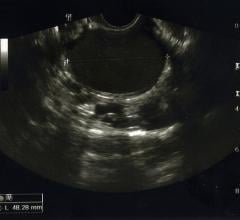April 1, 2014 — A minimally invasive treatment that delivers cancer-killing radiation directly to tumors shows promise in treating breast cancer that has spread to the liver when no other treatment options remain, according to research presented at the 2014 annual meeting of the Society of Interventional Radiology (SIR).
In the largest study of its kind to date, researchers reviewed treatment outcomes of 75 women ages 26-82 with chemotherapy-resistant breast cancer liver metastases, which were too large or too numerous to treat with other therapies. The outpatient treatment, called yttrium-90 (Y-90) radioembolization, was safe and provided disease stabilization in 98.5 percent of the women's treated liver tumors.
"Although this is not a cure, Y-90 radioembolization can shrink liver tumors, relieve painful symptoms, improve the quality of life and potentially extend survival," said Robert J. Lewandowski, M.D., FSIR, associate professor of radiology at Northwestern University Feinberg School of Medicine in Chicago. "While patient selection is important, the therapy is not limited by tumor size, shape, location or number, and it can ease the severity of disease in patients who cannot be treated effectively with other approaches."
Approximately 235,000 new cases of invasive breast cancer are diagnosed each year. Of these, approximately half of patients who develop metastatic disease will have cancer spread (metastasize) to the liver, explained Lewandowski. While chemotherapy is the standard treatment for these women, many will either have progressive liver disease despite multiple different treatment regimens while others will not tolerate the side effects from toxic agents. Currently, patients are considered forY-90 radioembolization when they have no other treatment options, he said.
"The value of Y-90 radioembolization in treating patients with non-operative primary liver cancer and metastatic colon cancer has been demonstrated," said Lewandowski. Given the low toxicity and high disease control rates, this therapy is expanding to other secondary hepatic malignancies, he said. "We're looking to gain maximal tumor control while minimizing toxicity and preserving quality of life.”
Y-90 radioembolization is a minimally invasive, image-guided therapy where an interventional radiologist inserts a small catheter through a tiny cut in the groin and guides it through the blood vessels and into the artery that supplies the liver. Micro beads are administered into the blood stream, floated out to the smaller vessels that feed the tumor and emit cancer-killing radiation from inside the tumor. Because Y-90 is targeted directly to the tumor, radiation damage to healthy surrounding tissues is minimized.
In this study, imaging follow-up was available for 69 of the 75 women treated. In all of these women, liver tumors were growing prior to treatment. Following radioembolization, there was disease control in 98.5 percent of the liver tumors, with more than 30 percent reduction in tumor size for 24 women. The treatment had few side effects.
"Y-90 warrants further study of its efficacy in providing supportive care to relieve patients of debilitating symptoms and control the progression of their disease," concluded Lewandowski.
For more information: www.sirmeeting.org


 April 16, 2024
April 16, 2024 








